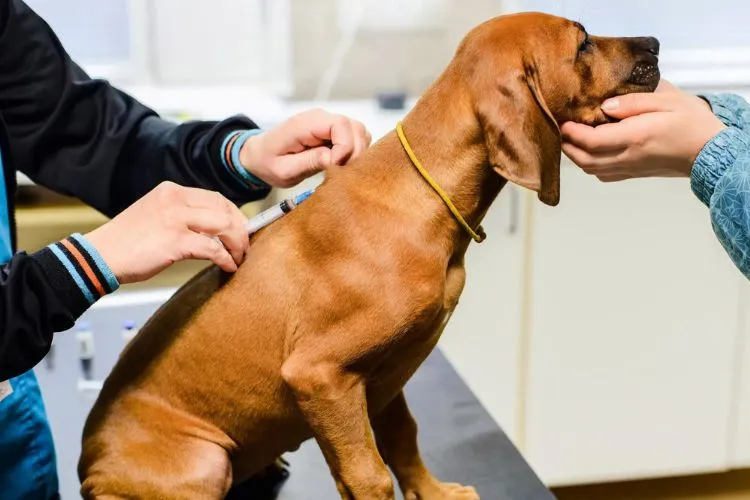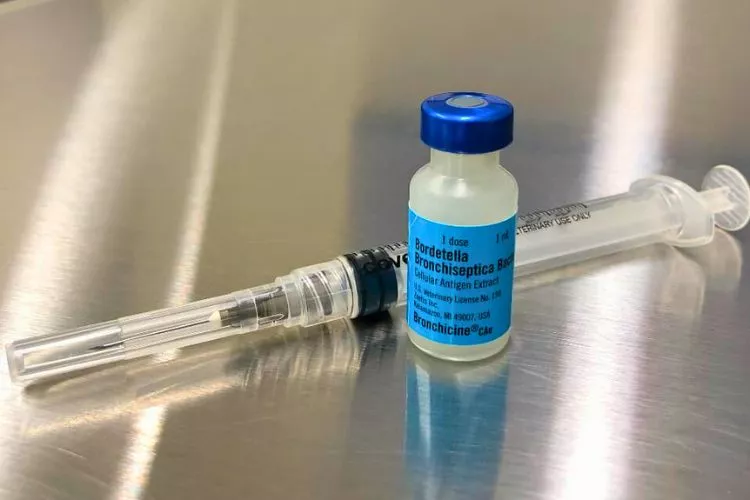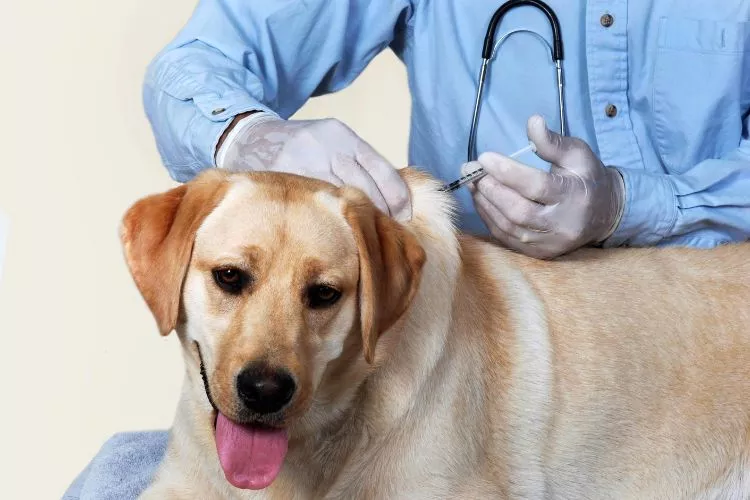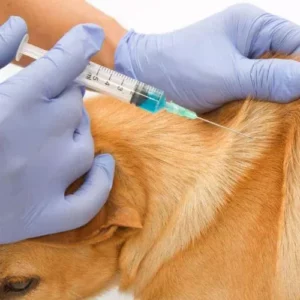The Bordetella bronchiseptica bacterium primarily causes ‘Kennel Cough,’ a prevalent canine illness. A vaccination exists to protect our dogs from this infection, but rumors about its fatal side effects abound. Can bordetella vaccine kill a dog?

In this article, I aim to analyze credible sources, consult veterinary expertise, and ultimately provide clarity on the question.
🐾 Can bordetella vaccine kill a dog?
No, a Bordetella vaccine will not kill a dog, when administered correctly. This vaccine helps to guard against the Bordetella bronchiseptica bacterium, commonly responsible for ‘Kennel Cough‘.
As with any vaccine, it may provoke some mild side effects such as loss of appetite, low-grade fever, or temporary dormant behavior. Extremely rare cases of severe reactions, including anaphylaxis, can occur as with any type of inoculation in any species, including humans.
These require immediate veterinary attention, but they do not typically result in death. To note, the benefits provided by the Bordetella vaccine in protecting dogs from developing ‘Kennel Cough’ largely outweigh these infrequent risks.
Furthermore, ensuring a comprehensive health check and assessment with a vet before any vaccinations can greatly mitigate potential risks.
Vaccinations, including the Bordetella vaccine, are widely considered a fundamental aspect of pet healthcare to promote longevity and quality of life.
🐾 Is the Bordetella vaccine for dogs a live virus?
Yes, the Bordetella vaccine for dogs does contain a live, but weakened (avirulent or attenuated), form of the Bordetella bronchiseptica bacterium. There are three types of Bordetella vaccines: injectable, oral, and intranasal.

The injectable form contains a killed or inactivated version of the bacteria, while the oral and intranasal versions contain a live attenuated bacteria. These vaccines work by stimulating the dog’s immune system to recognize and fight off the Bordetella bronchiseptica bacterium without causing the full-blown disease.
The immune response developed from this exposure prepares the body to effectively combat future encounters with the actual, virulent bacteria.
Therefore, while the Bordetella vaccines that are either orally or intranasally administered do contain live bacteria, it is not in a form that would typically cause illness under standard conditions. These vaccines are considered safe and are commonly used in veterinary medicine.
🐾 Is Bordetella vaccine harmful to dogs?
The Bordetella vaccine is generally safe and not considered harmful to dogs. As with any vaccination, there can be potential side effects, but these are usually mild and temporary. Side effects can include lethargy, loss of appetite, fever, or a mild cough.
Rarely, allergic reactions such as facial swelling, vomiting, or difficulty breathing can occur; these would require immediate veterinary attention. Severe reactions are extremely uncommon.
The potential risks of the Bordetella vaccine must be weighed against the benefits. The vaccine is designed to protect dogs from Bordetella bronchiseptica, the bacteria primarily responsible for ‘Kennel Cough‘, which can cause severe respiratory illness.
Dogs that are frequently in contact with other dogs, such as at kennels, dog parks, and grooming salons, are at higher risk for exposure, making vaccination beneficial. As always, decisions regarding vaccinations should be made in consultation with a trusted veterinarian.
🐾 What dogs should not get Bordetella vaccine?
While the Bordetella vaccine is generally safe for most dogs, some dogs might not be good candidates for this immunization.

- Young Puppies: Depending on the product, the Bordetella vaccine may not be suitable for dogs under a certain age. Some vaccines recommend not being given to puppies under three weeks of age.
- Medical Conditions: Dogs with compromised immune systems, serious chronic illnesses, or active, untreated infections may not be suitable candidates for Bordetella vaccines. Vaccination could potentially worsen their health condition.
- Recent Surgery/Severe Stress: Dogs that recently underwent surgery or are under severe stress might need to wait until they are fully recovered or their situation improves before receiving the vaccine.
- Previous Vaccine Reactions: If your dog had severe adverse reactions to previous vaccines, particularly Bordetella vaccine, it may not be advisable to give them another dose.
- Elderly Dogs: Older dogs not exposed to other dogs may not need the Bordetella vaccine.
- Pregnant Dogs: Vaccination during pregnancy is generally not recommended unless under particular circumstances where benefits outweigh potential risks.
Always consult your vet before deciding on any vaccine for your pet. Your vet will consider your dog’s overall health, their potential exposure to the Bordetella bacteria, and your lifestyle when making a recommendation.
🐾 What dog vaccines are not necessary?
There are two types of vaccines for dogs: “core” vaccines, which are essential for all dogs, and “non-core” vaccines, recommended based on a dog’s specific risk factors and lifestyle. Each dog’s vaccination regimen should always be tailored individually, in consultation with a veterinarian.

Core vaccines include:
- Rabies
- Canine Distemper
- Canine Parvovirus
- Canine Adenovirus (Type 1 and 2)
Non-Core vaccines are not considered necessary for every dog. They include:
- Bordetella (Kennel Cough)
- Lyme Disease: Only encouraged for dogs in or travelling to tick-infested areas where Lyme disease is prevalent.
- Leptospirosis: Advised for dogs with exposure to wildlife and standing water.
- Canine Influenza: Primarily for dogs frequently boarded, groomed, or exposed to large groups of dogs.
- Canine Parainfluenza: Mainly for dogs with high exposure to other dogs.
- Coronavirus: Rarely recommended for dogs.
Once again, non-core vaccines are advised based on the pet’s lifestyle, geographical area, and contact with potential carriers. Always consult your veterinarian to identify a personalized vaccination protocol for your dog.
🐾 Bordetella vaccine side effects in dogs
Although the Bordetella vaccine is generally safe for dogs, as with any vaccine, there can be potential side effects. These side effects are usually mild, temporary, and subside within a few days.

Common mild side effects
- Lethargy: Dogs may become tired or sluggish after receiving the vaccine.
- Loss of appetite: A temporary decrease in appetite is a common side effect.
- Mild fever: Some dogs may develop a low-grade fever following vaccination.
- Mild cough: A temporary mild cough may develop, typically subsiding after a few days.
- Sneezing and nasal discharge: Particularly seen with the intranasal version of the vaccine, sneezing and mild nasal discharge are possible side effects, usually lasting only a few days.
Rare side effects
- Allergic reaction: Symptoms of an allergic reaction include facial swelling, hives, vomiting, diarrhea, or difficulty breathing. Seek immediate veterinary attention if these occur.
- Pain or swelling at the injection site: This is more common with injectable vaccines but usually subsides within a few days. If it persists or worsens, consult your veterinarian.
It is important to monitor your dog after any vaccination to ensure they do not exhibit any unusual symptoms. Though side effects are generally rare and mild, always contact your veterinarian if you are concerned about your dog’s reaction to the Bordetella vaccine or any other vaccination.
🐾 How long does kennel cough vaccine side effects last?
Side effects from the kennel cough vaccine are generally mild and temporary; they commonly include symptoms such as sneezing, coughing, nasal discharge, and a low-grade fever.

These side effects typically resolve within 1-2 weeks following the vaccination. However, in some cases, dogs may experience these side effects for up to 3 weeks.
These reactions are normal and indicate that the vaccine is triggering an immune response in the dog’s body, thereby offering protection against canine infectious respiratory disease complex.
You may also find useful: Will 10 mg of melatonin hurt a dog?
🐾 frequently asked questions (FAQs)
No, Bordetella and parvo vaccines are different. Bordetella vaccine protects against Kennel Cough, a contagious respiratory disease caused by the Bordetella bronchiseptica bacterium. Parvo vaccine protects against Canine Parvovirus, a highly contagious and potentially fatal viral illness affecting the gastrointestinal tract and immune system.
Some breeds are at higher risk for vaccine reactions, including small breeds like Dachshunds, Chihuahuas, Pugs, and Miniature Pinschers, and other breeds like Weimaraners and Akitas. However, any dog can experience a reaction, so it’s essential to monitor your dog after vaccination and report adverse effects to your veterinarian.
Yes, it is normal for a dog to cough after receiving the Bordetella vaccine, especially the intranasal or oral versions. Coughing typically occurs within a few days after vaccination and subsides within a week or two. This mild coughing is a normal immune response to the vaccine and does not generally require medical attention.
It is extremely rare for the Bordetella vaccine to cause pneumonia in dogs. The vaccine uses a weakened, live strain of the Bordetella bacteria designed to stimulate an immune response without causing illness. While most side effects are mild and temporary, consult your veterinarian if your dog exhibits severe respiratory distress following vaccination.
It’s uncommon, but some dogs may experience an upset stomach following the Bordetella vaccine. The most common side effects include mild coughing, sneezing, and nasal discharge. However, if your dog experiences gastrointestinal issues like vomiting, diarrhea, or appetite loss after vaccination, monitor them closely and consult with your veterinarian if symptoms worsen or persist.
It is not unusual for dogs to experience some mild, temporary side effects after vaccination. These may include lethargy, low-grade fever, mild coughing, or gastrointestinal issues such as an upset stomach. These side effects are typically a normal part of the immune system’s response to the vaccine. If your dog becomes sick after vaccination, observe them closely for any worsening or persistent symptoms and consult your veterinarian as needed.
Conclusion:
While the Bordetella vaccine may have potential side effects, it’s highly unlikely that it can cause fatal harm to a healthy dog. As with any vaccine, adverse responses are typically rare, mild, and short-lived.
More severe reactions, while extremely rare, should be addressed promptly with veterinary care. Overall, the Bordetella vaccine plays a critical role in protecting dogs from contracting and spreading Kennel Cough, particularly those in high-risk environments.
The benefits far outweigh the risks, and responsible pet owners should consult with their veterinarians to make the best-informed decisions regarding their pets’ health.
